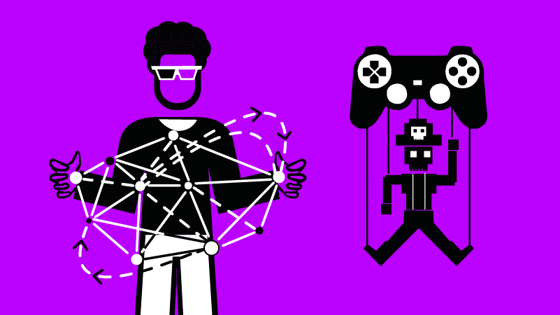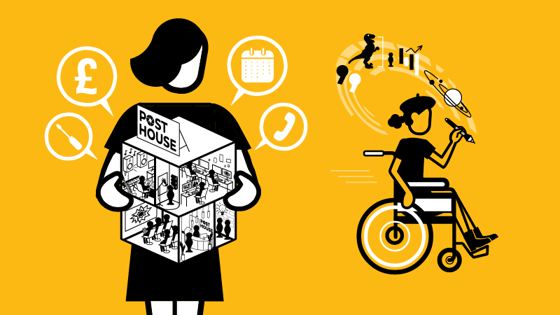Broadcast engineering
Control room engineer
Also known as: MCR engineer, Control room engineer, Master control operator

What does a control room engineer do?
The control room or master control room (MCR) engineer plays a key role in making sure programmes reach our homes on TV or on the internet to our computers, tablets and phones. They also do a vital job linking up different studios and outside broadcast units – for example, connecting the main Channel 4 News studio in London to a smaller regional studio in the north of England or to a reporter coming in live from China.
The MCR is a 24-hour operation with many feeds coming in and programmes going out all over the world. In some broadcast centres, MCR engineers may also be responsible for recording complete programmes, such as documentaries, quiz shows or news reports that need to be played out to a planned broadcast schedule.
There are different ways to send the signals that carry programmes from the MCR to our screens, such as using satellites (like Sky TV), terrestrial transmitter networks (like Freeview) and the internet. Some MCR engineers now specialise in internet technology, as it's becoming more and more popular in providing services such as BBC iPlayer and Netflix.
MCR engineers need to check the quality and sound of all the signals they receive. Sometimes they will need to talk to producers or reporters in front of the camera to let them know there’s a technical problem that needs solving. For this reason, they need to be understanding and have good communication skills, especially as the people on the other end of the line may be working in difficult and sometimes dangerous conditions.
Broadcasting often takes place 24 hours a day, seven days a week, so working as an MCR engineer usually involves shift work.
Watch and read
- Nikki Lushington, lead MCR Engineer at Timeline
- Inside the control room: turning NFL football into primetime television
- Behind the scenes: master control
- How the BBC’s Springwatch was produced in the age of the coronavirus
What are control room engineers good at?
- Understanding signal technology: having expert knowledge of types of signals and broadcasting systems
- Multi-tasking: being good at keeping on top of the many signals and equipment used during playout
- Staying calm under pressure: maintaining a level head to ensure the distribution goes out as planned and on time
- Communication: knowing how to explain clearly what is going on in the control room to people in the studios or on location
- Responsiveness: reacting quickly to issues and emergencies.
Who do control room engineers work with?
Members of the operational team such as the vision guarantee or location manager, who are in charge of the video feeds in the studio and on location. They also work with satcomms engineers, radio frequency (RF) engineers and OB engineers.
How do you become a control room engineer?
You start off as a general broadcast engineer or take on the role of trainee MCR engineer. You might start as an engineer in another area, such as a trainee satcomms engineer, and transfer across to maintenance. Some MCR engineers have a university or college qualification in a relevant subject, while others go down the more vocational route and acquire engineering skills through work experience or an apprenticeship.
At school or college
If you’re interested in a career in broadcast engineering, A-levels in maths, physics and computer science would be good to get under your belt. You could combine these with subjects from the arts and humanities, such as English, history or music, which may come in useful for the content of the programmes you work with. Languages are also handy if you need to travel or want to work with foreign broadcasters – studying A-level Spanish might be your ticket to working at the 2026 World Cup in Mexico!
The following Level 3 vocational qualifications are also relevant to this role:
- BTEC in Engineering with Engineering Maths
- Cambridge Technical Extended Certificate in Engineering
- BTEC National Foundation Diploma in Engineering
- C&G Technical Certificate in Engineering
- EAL Technical Diploma/Extended Diploma in Engineering Technologies
- BTEC Diploma/Extended Diploma in Electrical and Electronic Engineering
- City & Guilds Advanced Technical Diploma in Electrical Installation
- EAL Diploma/Advanced Diploma in Electrical Installation
Selected schools and colleges have also started offering T-levels – a qualification equivalent to three A-levels that is designed to help you get into the industry of your choice. Study is 80% classroom- and 20% work placement-based.
The following T-levels would help kickstart your career in broadcast engineering:
- Media, Broadcast and Production
- Digital Production, Design and Development
- Digital Support Services
- Digital Business Services
- Design and Development for Engineering and Manufacturing
- Maintenance, Installation and Repair for Engineering and Manufacturing
- Engineering, Manufacturing, Processing and Control
Apprenticeships
Apprenticeships are jobs with training. Search for apprenticeships in broadcast engineering with broadcasters like BBC and Sky. Go to What’s an apprenticeship? to find out more and Where can I find an apprenticeship? to find apprenticeships in your region. Alternatively, you can approach companies directly. Take a look at our list of apprenticeships to find the schemes of the main broadcasters.
The BBC has a three-year broadcast and media systems degree apprenticeship that offers a mix of practical experience and university study in all areas of media systems engineering. You may also be interested in the level 3 apprenticeship for broadcast and media systems technical operator.
Volunteer
Get involved with events in your local community, whether that’s running the sound for your school talent show, managing the special effects for an amateur dramatics society or helping out at a volunteer-run radio station.
Contact theatre productions or local music venues that can get you behind the scenes of a production environment. Anything that gives you experience dealing with equipment in a live environment will be helpful. Voluntary experience is great for your CV, because it shows you’re enthusiastic, have technical ability and experience and you work well as part of a team.
Get a degree
A degree in a maths or science subject would stand you in good stead for entering the world of broadcast engineering. You could also look at electronic engineering, software design or computing. Go to ScreenSkills Select to find university and college courses accredited by ScreenSkills.
Look outside the industry
If you can’t or don’t want to get into broadcast engineering straight away, industries that require similar skills include telecoms, live events and radio. These would enable you to strengthen your technical abilities and get experience with technical equipment.
Being a master control room engineer is also a managerial role, so try to find roles that provide experience with technical equipment as well as increasing responsibility within a team. For roles that have both technical and managerial aspects, look into smaller film and music video productions.
Get work experience
Write to local production companies and ask if they offer technical assistant roles. Keep an eye out for work experience opportunities at the BBC, ITV, Channel 4, Sky and the PACT Indie Diversity Training Scheme.
Alternatively, try approaching a rental equipment company that supplies productions with the gear they need. This will enable you to get your hands on equipment, learn more about it and get to know people who work in TV.
Take a short course
If you are over 18, make a ScreenSkills account and check out ScreenSkills’ Training and opportunities page and click on Training to see what courses are available, whether they are in person or online. The training doesn’t have to be linked directly to broadcast engineering; for example, a short course on developing resilience would help you understand how to thrive in challenging circumstances.
Network
Get to know people in the film and TV industry by attending events such as ScreenSkills’ Open Doors. Go to Training and opportunities and use the events filter to find out what’s on. Meet professionals and ask them questions about their work, while demonstrating interest in and knowledge of the industry. Offer to provide them with your professional contact details and try to stay in touch with them. Go to Network well to learn how to do this.
Network online
Create a LinkedIn profile. See if there are Facebook pages or other social media groups for people making film and TV in your area. Create a ScreenSkills profile. There are a lot of crewing agencies that will charge you to be on their books. Sign up to the free ones initially. Wales Screen, Northern Ireland Screen and Filming in England offer free crew databases and opportunities to network in person. Find a film office near you and get connected. If you do sign up to paid sites, make sure they specialise in the areas in which you’re interested.
Search for jobs
Search for jobs on the broadcasters’ websites as well as on LinkedIn and other job-hunting websites. Make use of the ScreenSkills jobs board. You can also send a short speculative letter with your CV to technical managers or vision supervisors.
You might also be interested in...
Being an RF engineer or satcomms engineer, if you’re interested in the science behind this role, as they also work with signal transmission in other areas of broadcast engineering.
Further resources
- Why the Industry needs more Broadcast Engineers | NFTS
- BritishFilm Commission list of UK studios
- Engineering Council
- Rise: Women in Broadcast
- The Institution of Engineering and Technology
- The International Trade Association for the Broadcast & Media Industry
- Society of Media Professionals, Technologists and Engineers
- International Broadcasting Convention
- The Media Production & Technology Show
- E&T (Engineering & Technology) magazine
- NEP UK and Ireland
- Broadcast – Tech Talks
- Broadcast Buddy TV YouTube channel
- BBC Research and Development
- BBC Academy
- ITV Entry Careers
- Sky early careers
- 4Skills (Channel 4)
- Bectu (the media and entertainment union)
- Bectu Ratecards







